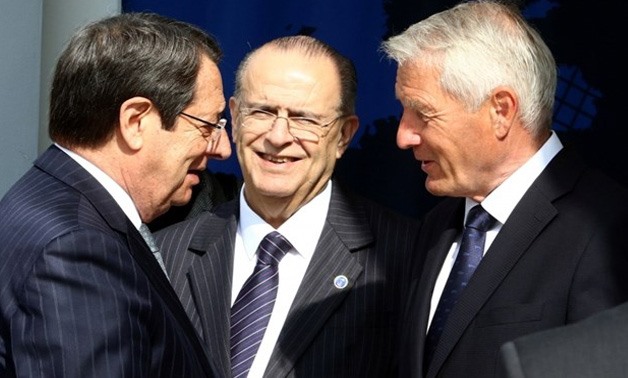
Cypriot President Nicos Anastasiades (L), Council of Europe Secretary General Thorbjorn Jagland (R) and Cypriot Foreign Minister Ioannis Kasoulides - REUTERS/Yiannis Kourtoglou
Nicosia - May 19, 2017: Six countries on Friday signed a Council of Europe convention which criminalizes the illegal trade in "blood antiquities" that can be used to finance terrorism, officials said.
The initiative launched at a CoE ministerial meeting in Nicosia aims to boost efforts to combat the purchase and sale of antiquities and cultural property, and specifically puts greater responsibility on buyers.
"Today, the international community takes a crucial leap forward in the protection of our cultural heritage, especially in the efforts to combat the trade in blood antiquities by trans-national organised crime and terrorist networks," said Cyprus Foreign Minister Ioannis Kasoulides.
He said it was the only international treaty that deals specifically with the criminalisation of the illicit trafficking of cultural property.
The Nicosia Convention outlaws unlawful excavation, the importation and exportation of stolen antiquities, and their illegal acquisition.
It also promotes international cooperation aimed at enhancing international legal frameworks against cultural trafficking.
"I would also like to thank Armenia, Greece, Portugal, San Marino and Mexico for signing the convention today" along with Cyprus, said Kasoulides.
"I call on states to sign and ratify the Nicosia Convention as soon as possible; we have a collective responsibility to protect our cultural heritage and the heritage of mankind."
The convention will come into force after its ratification by national parliaments.
A key clause of the convention puts the burden of proof on buyers to demonstrate that a purchased item was not illicitly acquired.
Kasoulides said the Islamic State jihadist group and other extremist organisations had raised an estimated $150 million from the trafficking of stolen heritage.

Comments
Leave a Comment